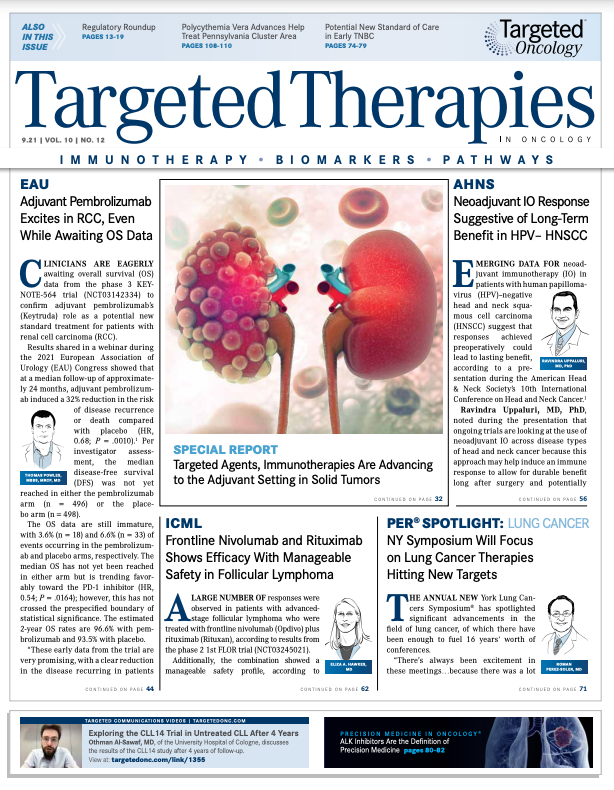Glioblastoma Treatment Is Slow to Change, but New Strategies Are Under Investigation
During the past 4 decades, glioblastoma has remained a cancer with one of the worst prognoses and is among the most debilitating.
During the past 4 decades, glioblastoma has remained a cancer with one of the worst prognoses and is among the most debilitating.
I remember a patient that I treated as a fellow. He was a 40-year-old man whose wife was pregnant. They had been trying for years to have a child, and at week 20 of her pregnancy, they discovered he had a brain tumor. This was 1989; he was treated with radiation therapy and temozolomide (Temodar) on a clinical trial. He died just after his son was born.
This left me paralyzed, yet every time I ran into his wife, she thanked me for my care and for con-vincing her not to have an abortion.
My next memorable patient with glioblastoma (GBM) was my husband, who presented after run-ning a marathon. In the examination room, his physician asked him to lift his right leg, and my husband promptly fell to the side. As a pathologist and an oncologist, the diagnosis was obvious and the outcome could not be denied. With aggressive treatment and clinical trials, we got 3 years—still not enough. It was clear to me that much more research was needed.
We have been treating GBM the same way for the past 30 years. Although the surgical techniques and the radiation therapy have improved, the che-motherapy drugs have stayed the same. We still use temozolomide with radiation and then continue it post radiation therapy.
Currently, GBM has a life expectancy of 14 to 15 months post diagnosis.
The molecular heterogeneity of GBM makes it difficult to treat. Our chemotherapy and immune therapies do not cross the blood-brain barrier, and the tumor has a propensity to mutate and become resistant to chemotherapy. In addition, GBM also has the ability to cause immune suppression. This combination makes it exceedingly difficult to treat and to test new drugs.
Molecular markers will hopefully show us better ways to treat these tumors. These include MGMT promoter methylation, IDH mutations, 1p19q deletion, EGFR variant III (EGFRvIII) amplification, TP53, PTEN, PI3K, PDGF, MAPK, NOT C H1/3, and CDK4/M E T.
Additionally, there are multiple immunotherapies to look at as potential treatment:
• Checkpoint inhibitors
• Monoclonal antibodies
• Cancer vaccines; dendritic cell vaccines
• Oncolytic viruses
• Adoptive T-cell therapy
• Adjuvant immunotherapy
• DV Vax-L
• Electromagnetic fields
• Proton beam radiation
Immunotherapies are important therapeutic alternatives in the management of brain tumors because an effective immune response could eliminate neoplastic cells. Crossing the blood-brain barrier is problematic for many therapies, and this is the same for chemotherapy; however, a few immune system cells possess the ability to cross and infiltrate the tumor, representing an advantage in comparison with antitumoral drugs. In glioblastoma, there is no effective elimina-tion of tumoral cells because of immunomod-ulation. This creates a microenvironment that is predominantly immunosuppressive, which allows tumoral proliferation.
Several strategies are under investigation to reduce immunosuppression in GBM cells.
Previously, the use of pertussis toxin (PTx) has been investigated as adjuvant therapy.1 Another study evaluated the cytotoxic effect of PTx in combination with temozolomide for GMB treatment.2 Survival increased after individual treatments, and this effect was enhanced with the combination of temozolomide plus PTx. PTx could be an immuno-therapeutic adjuvant approach and integral against GBM due to its multiple properties, either directly in glioma cells or modulating immunological subpopulations.
A trial of anti-CD25+ monoclonal antibody daclizumab (Zinbryta) and EGFRvIII vaccination in patients previously treated with temozolomide showed responses, accord-ing to investigators.3 Moreover, a greater EGFRvIII-specific humoral response was observed when combined with the mono-clonal antibody.
Additionally, PD-1 is located on the lymphocyte’s membrane and is associated with immunosuppression in several tumors, including GBM. Anti–PD-1 immunotherapy was evaluated along with stereotactic radio-surgery in a mouse intracranial GBM model.4 Using the combinatorial therapy, patients experienced longer-term survival, increased tumor-infiltrating cytotoxic T cells, and decreased regulatory T cells. So far, PD-1 inhibitors have not improved survival.
Bevacizumab (Avastin) has been approved for the treatment of GBM.5 It blocks the growth of new blood vessels, and it is used when the tumor relapses in combination with chemotherapy.
New drugs that show promise are abemaciclib (Verzenio), a cyclin-dependent kinase that may help in tumors with a mutation; veliparib in patients who may have BRCAmutations and DNA repair issues; ivosidenib (Tibsovo), which blocks abnormal IDH1 and IDH2 proteins; and savolitinib, which works by blocking c-Met.
It is clear that we have a lot of work to do to both prevent and treat brain tumors. We need to learn from hereditary causes of brain tumors. Although most tumors occur sporadically, some genetic abnormalities predispose persons to GBM. They include neurofibromatosis, Turcot syndrome, and Li-Fraumeni syndrome. Study of these genetic causes may help find new ways to treat GBM.
In conclusion, we are far from curing GBM, far from early detection, and far from new treatments. However, we must continue to try new combinations and bring science and patients together in clinical trials.
REFERENCES
1. Orozco-Morales M, Sánchez-García FJ, Guevara-Salazar P, et al. Adju-vant immunotherapy of C6 glioma in rats with pertussis toxin. J Cancer Res Clin Oncol. 2012;138(1):23-33. doi:10.1007/s00432-011-1069-y
2. Magaña-Maldonado R, Manoutcharian K, Hernández-Pedro NY, et al. Concomitant treatment with pertussis toxin plus temozolomide increases the survival of rats bearing intracerebral RG2 glioma. J Can-cer Res Clin Oncol. 2014;140(2):291-301. doi:10.1007/s00432-013-1565-3
3. Thomas AA, Fisher JL, Ernstoff MS, Fadul CE. Vaccine-based im-munotherapy for glioblastoma. CNS Oncol. 2013;2(4):331-349. doi:10.2217/cns.13.29
4. Zeng J, See AP, Phallen J, et al. Anti-PD-1 blockade and stereotac-tic radiation produce long-term survival in mice with intracranial glio-mas. Int J Radiat Oncol Biol Phys. 2013;86(2):343-349. doi:10.1016/j.ijrobp.2012.12.025
5. Cohen MH, Shen YL, Keegan P, Pazdur R. FDA drug approval sum-mary: bevacizumab (Avastin) as treatment of recurrent glioblastoma multiforme. Oncologist. 2009;14(11):1131-1138. doi:10.1634/theon-cologist.2009-0121
